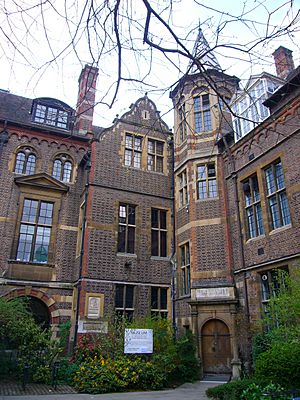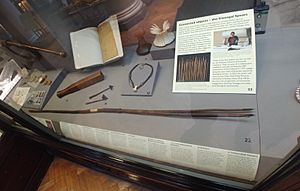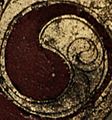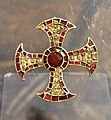Museum of Archaeology and Anthropology, University of Cambridge facts for kids

Museum of Archeology and Anthropology, Cambridge
|
|
| Location | Cambridge |
|---|---|
| Type | University Museum |
| Collections | local antiquities, together with archaeological and ethnographic artefacts from around the world |
| Visitors | 76,669 (2019) |
| Owner | University of Cambridge |
| University of Cambridge Museums | |
|
|
The Museum of Archaeology and Anthropology, also known as MAA, is a cool place at the University of Cambridge. It holds amazing collections of old items from the local area. It also has archaeological and ethnographic objects from all over the world.
You can find the museum on the university's Downing Site. It is at the corner of Downing Street and Tennis Court Road. In 2013, the museum reopened after a big update. It now has a new public entrance right on Downing Street. The MAA is part of the University of Cambridge Museums group.
Contents
Discovering the Museum's Past
The museum started in 1884. Back then, it was called the Museum of General and Local Archaeology. Its first collections included old items found by the Cambridge Antiquarian Society. It also had objects from Polynesia given by Alfred Maudslay and Sir Arthur Gordon.
Early Collections and Explorers
Anatole von Hügel was the museum's first curator. He gave his own collection of items from the South Pacific. More objects came from the 1898 Cambridge expedition to the Torres Strait. This trip was led by Alfred Haddon and W. H. R. Rivers.
Haddon and Rivers encouraged their students to keep collecting for the museum. These students included Alfred Radcliffe-Brown, John Layard, and Gregory Bateson. They gathered items during their fieldwork studying different cultures.
Moving to a New Home
Von Hügel worked to get a bigger, specially built home for the museum. In 1913, the museum moved to its current spot on Downing Street. However, the new display areas were not fully ready until after World War I.
During the 1910s and 1920s, the museum received many old collections. These included items gathered during James Cook's three famous voyages.
Modern Updates and Leadership
The MAA closed for a long time for renovations. It reopened in 2013 with a completely new ground floor. It also gained a new space for special exhibits and updated archaeology galleries.
Many people have led the museum since von Hügel. Nicholas Thomas has been the director since 2006.
The museum is also part of a project called True Echoes. This project works with the British Museum. They study old audio recordings in anthropology. They also connect related objects, photos, and field notes.
The museum uses a former nuclear bunker as a storage area. It is called the Centre for Material Culture.
Exploring the Museum's Exhibits
The museum has exciting displays spread across three floors.
- Ground floor: The Clarke Hall shows the archaeology of Cambridge. The Li Ka Shing Gallery hosts temporary exhibitions.
- First floor: The Maudslay Hall focuses on anthropology, which is the study of human societies and cultures.
- Second floor: The Andrews Gallery displays world archaeology.
The museum building itself is quite old and special. It even includes part of a choir screen from Winchester Cathedral.
You can see a display about the Trumpington bed burial on the ground floor. This is a fascinating Anglo-Saxon discovery.
The Gweagal Spears: A Journey Through Time

In 1770, Captain James Cook and botanist Joseph Banks returned to England. They had been on a voyage in the South Pacific Ocean. They brought back many plants, animals, and cultural items.
Spears from Australia
Among these items were about fifty Australian Aboriginal spears. These spears belonged to the Gweagal people. Cook gave the spears to his supporter, John Montagu, 4th Earl of Sandwich. He then gave them to Trinity College.
Today, four of these spears still exist. They are some of the few remaining objects from Cook's first voyage. The Gweagal Spears are owned by Trinity College. However, you can see them on display at the museum.
Images for kids
-
Haida totem pole
-
Pectoral cross from the Trumpington bed burial
-
Display of Benin Bronzes
See also
 In Spanish: Museo de Arqueología y Antropología de la Universidad de Cambridge para niños
In Spanish: Museo de Arqueología y Antropología de la Universidad de Cambridge para niños
 | Charles R. Drew |
 | Benjamin Banneker |
 | Jane C. Wright |
 | Roger Arliner Young |







